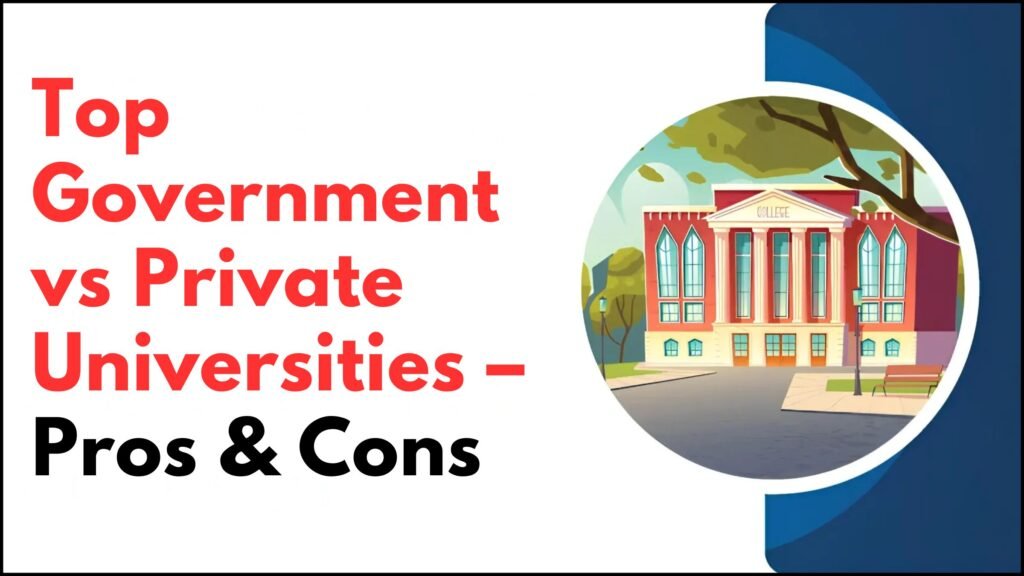
Choosing the right university is one of the most important decisions in a student’s life. A university shapes not only a student’s academic future but also their personal growth. In India, students often face a tough choice between government and private universities. Each type offers different benefits and drawbacks. This article explains the pros and cons of both government and private universities in simple terms, helping students and parents make better decisions.
Differences Between Government and Private Universities
| Point of Comparison | Government Universities | Private Universities |
|---|---|---|
| Funding Source | Funded by the state or central government | Funded by private organizations or trusts |
| Tuition Fees | Low and affordable | High and sometimes very expensive |
| Admission Process | Based on entrance exams and merit | Based on merit, management quota, and donations |
| Infrastructure | Basic infrastructure, improving gradually | Modern buildings and well-equipped labs |
| Faculty | Experienced and qualified teachers | Mix of experienced and young faculty |
| Student Diversity | High, students from various backgrounds | Limited, often from urban and upper-middle-class families |
| Class Size | Large, sometimes overcrowded | Small, with more attention to students |
| Placement Opportunities | A mix of experienced and young faculty | Strong focus on placements with active industry links |
| Research Facilities | Well-established research programs | Improving but still developing in many private universities |
| Global Recognition | Higher in some reputed government universities | Varies depending on the course and college |
Pros of Government Universities
- Low Cost of Education
Government universities charge very little tuition, making them affordable for students from all backgrounds. - High Student Diversity
Students from different states, cultures, and economic backgrounds come together, leading to a rich learning environment. - Experienced Faculty
Most government institutions hire highly qualified professors with years of teaching and research experience. - Strong Academic Reputation
Institutions like IITs, IIMs, and central universities have global reputations and strong academic records. - Subsidies and Scholarships
Many scholarships and fee waivers are offered for economically weaker students. - Focus on Research
Good research infrastructure is available in central universities and reputed state universities. - Alumni Network
Older government universities have strong alumni networks that help in career guidance and job placements.
Cons of Government Universities
- Limited Seats
A very small number of seats are available, making competition extremely high. - Overcrowded Classrooms
Large numbers of students in each class reduce individual attention from teachers. - Outdated Infrastructure
Some colleges still lack modern equipment, smart classrooms, or updated libraries. - Administrative Delays
Government processes are often slow and can delay exams, results, or infrastructure projects. - Less Focus on Soft Skills
Emphasis is more on academics and less on personality development or spoken English training.
Pros of Private Universities
- Modern Infrastructure
Campuses are equipped with smart classrooms, air-conditioned labs, and digital libraries. - Industry-Oriented Courses
Many private universities design courses in partnership with industries, increasing job opportunities. - Better Placement Support
Active placement cells help students connect with companies and organize campus interviews. - Global Exposure
Tie-ups with foreign universities allow students to study abroad or gain international exposure. - Personal Attention
Smaller class sizes help teachers focus on individual student progress. - Focus on Communication and Skills
Training in English, public speaking, and soft skills is often part of the course. - Flexible Curriculum
Courses are often updated quickly based on industry needs and student feedback.
Cons of Private Universities
- High Fees
Education is often expensive and can be unaffordable for many families without loans or scholarships. - Inconsistent Quality
Not all private universities maintain high teaching standards or academic discipline. - Limited Research Focus
Research activities are limited in some institutions due to lack of funding or interest. - Profit-Driven Approach
Some universities prioritize profits over student welfare or academic quality. - Recognition Issues
Degrees from some private universities may not be widely accepted or recognized. - Faculty Retention Problems
Constant faculty changes can affect the quality and continuity of education.
Summary: Pros and Cons
| Category | Government Universities | Private Universities |
|---|---|---|
| Pros | Low cost, experienced faculty, research focus | Modern facilities, good placements, skill-based training |
| Cons | High fees, inconsistent quality, and less focus on research | Low-cost, experienced faculty, research focus |
Important Factors to Consider Before Choosing
- Financial Situation
Government universities are better if the budget is limited. - Career Goals
Private universities offer more industry exposure, good for job-oriented courses. - Course Type
Research-oriented students may prefer government institutions with better labs and funding. - Location Preference
Private universities are mostly in urban areas, while government colleges are spread across the country. - Recognition and Accreditation
Always check if the university is recognized by UGC, AICTE, or NAAC.
Last Words
A perfect university does not exist. A government university may offer quality education at a low cost, but it may lack modern infrastructure. A private university may provide excellent facilities, but at a higher price. Students should carefully consider their goals, budget, and learning preferences before making a choice. A well-informed decision will lead to a better academic journey and a successful future.





